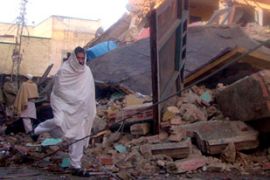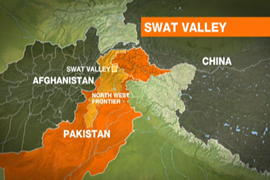Pakistan-Taliban Swat battle rages
PM vows to restore peace as Al Jazeera finds Taliban in control of violence-racked valley.

Residents were living in fear and government forces and other state employees were bearing the brunt of many attacks, some even being beheaded, as fighters loyal to Maulana Fazlullah, a local leader, waged an armed campaign against the government, our correspondent said.
Escalating violence
| In depth |
|
|
The Pakistan military launched an operation against the groups operating in Swat in 2007, but Fazlullah’s supporters have blown up 173 schools – 105 of them for girls – since 2007, Sher Afzal, a Pakistani education ministry official, said last month.
The violence was getting out of control, with decapitated bodies of policemen left with notes warning the authorities, a common sight on streets in the area, our correspondent said.
Elected representatives who had promised to bring peace left the area after the escalation of violence, leaving the people in the lurch, he added.
|
Have you witnessed the violence in Pakistan’s Swat valley? Send your video, pictures or tell us of your experiences here |
Hundreds of people have reportedly fled the area in recent days, heading for two relief camps opened at schools in and near the region’s main city of Mingora.
Wajid Ali Khan, a provincial minister, said “the fighting in the valley has made it almost impossible for civilians to stay there”.
Up to a third of the 1.5 million population are estimated to have left Swat, which until recently was a prime tourist destination because of its natural beauty and ski resorts.
‘Complex situation’
Imtiaz Gul, a Pakistani security analyst, told Al Jazeera that what prevails in Swat “is a very difficult and complex situation” that will need both a military and political approach to resolve.
 |
“It has to be a combination of blitzkrieg, surgical strikes and operations in the Swat valley, backed up by the civilian administration as well as the political leadership,” he said.
“Most of the representatives have simply abandoned the area for fear of their lives … more than 70 per cent of policemen have either left their jobs, are sitting at home, or have been eliminated or executed.”
Prime Minister Gilani suggested that negotiations could end the violence.
“We are looking at various options. We have both the capacity and the will, but we want a strategy in which there is no collateral damage,” he said.
But some security officials have criticised a previous peace deal with pro-Taliban fighters for allowing them to regroup and strengthen.

 Swat: Pakistan’s lost paradise
Swat: Pakistan’s lost paradise